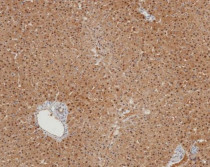ARG66822
anti-Arginase 1 antibody [SQab20234]
anti-Arginase 1 antibody [SQab20234] for IHC-Formalin-fixed paraffin-embedded sections,Western blot and Human,Mouse,Rat

3
Overview
| Product Description | Recombinant Rabbit Monoclonal antibody [SQab20234] recognizes Arginase 1 |
|---|---|
| Tested Reactivity | Hu, Ms, Rat |
| Tested Application | IHC-P, WB |
| Host | Rabbit |
| Clonality | Monoclonal |
| Clone | SQab20234 |
| Isotype | IgG |
| Target Name | Arginase 1 |
| Antigen Species | Human |
| Immunogen | Synthetic peptide within aa. 300-400 of Human Arginase 1. |
| Conjugation | Un-conjugated |
| Alternate Names | EC 3.5.3.1; Type I arginase; Arginase-1; Liver-type arginase |
Application Instructions
| Application Suggestion |
|
||||||
|---|---|---|---|---|---|---|---|
| Application Note | IHC-P: Antigen Retrieval: Heat mediation was performed in Tris/EDTA buffer (pH 9.0), primary antibody incubate at RT (18°C - 25°C) for 30 minutes. * The dilutions indicate recommended starting dilutions and the optimal dilutions or concentrations should be determined by the scientist. |
||||||
| Observed Size | 36-40 kDa |
Properties
| Form | Liquid |
|---|---|
| Purification | Purification with Protein A. |
| Buffer | PBS, 0.01% Sodium azide, 40% Glycerol and 0.05% BSA. |
| Preservative | 0.01% Sodium azide |
| Stabilizer | 40% Glycerol and 0.05% BSA |
| Storage Instruction | For continuous use, store undiluted antibody at 2-8°C for up to a week. For long-term storage, aliquot and store at -20°C. Storage in frost free freezers is not recommended. Avoid repeated freeze/thaw cycles. Suggest spin the vial prior to opening. The antibody solution should be gently mixed before use. |
| Note | For laboratory research only, not for drug, diagnostic or other use. |
Bioinformation
| Database Links | |
|---|---|
| Gene Symbol | ARG1 |
| Gene Full Name | arginase 1 |
| Background | Arginase catalyzes the hydrolysis of arginine to ornithine and urea. At least two isoforms of mammalian arginase exist (types I and II) which differ in their tissue distribution, subcellular localization, immunologic crossreactivity and physiologic function. The type I isoform encoded by this gene, is a cytosolic enzyme and expressed predominantly in the liver as a component of the urea cycle. Inherited deficiency of this enzyme results in argininemia, an autosomal recessive disorder characterized by hyperammonemia. Two transcript variants encoding different isoforms have been found for this gene. [provided by RefSeq, Sep 2011] |
| Function | Key element of the urea cycle converting L-arginine to urea and L-ornithine, which is further metabolized into metabolites proline and polyamides that drive collagen synthesis and bioenergetic pathways critical for cell proliferation, respectively; the urea cycle takes place primarily in the liver and, to a lesser extent, in the kidneys. Functions in L-arginine homeostasis in nonhepatic tissues characterized by the competition between nitric oxide synthase (NOS) and arginase for the available intracellular substrate arginine. Arginine metabolism is a critical regulator of innate and adaptive immune responses. Involved in an antimicrobial effector pathway in polymorphonuclear granulocytes (PMN). Upon PMN cell death is liberated from the phagolysosome and depletes arginine in the microenvironment leading to suppressed T cell and natural killer (NK) cell proliferation and cytokine secretion (PubMed:15546957, PubMed:16709924, PubMed:19380772). In group 2 innate lymphoid cells (ILC2s) promotes acute type 2 inflammation in the lung and is involved in optimal ILC2 proliferation but not survival (By similarity). In humans, the immunological role in the monocytic/macrophage/dendritic cell (DC) lineage is unsure. [UniProt] |
| Cellular Localization | Cytoplasm. Cytoplasmic granule. Note=Localized in azurophil granules of neutrophils (PubMed:15546957). [UniProt] |
| Calculated MW | 35 kDa |
| PTM | Phosphoprotein |
Images (2) Click the Picture to Zoom In
-
ARG66822 anti-Arginase 1 antibody [SQab20234] IHC-P image
Immunohistochemistry: Formalin/PFA-fixed and paraffin-embedded Human liver tissue. Antigen Retrieval: Heat mediation was performed in Tris/EDTA buffer (pH 9.0). The tissue section was stained with ARG66822 anti-Arginase 1 antibody [SQab20234].
-
ARG66822 anti-Arginase 1 antibody [SQab20234] WB image (Customer review)
Western blot: MOLT4 stained with ARG66822 anti-Arginase 1 antibody [SQab20234] at 1:500 dilution.
Customer's Feedback







